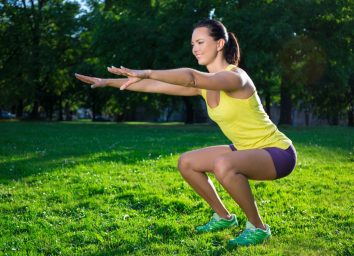Secret Side Effects of Lifting Weights You Never Knew, Says Science

Anyone who watched Popeye as a kid (or Jersey Shore as an adult) knows the basics of what happens when you start lifting weights regularly: you build muscle and bulk up. Basically, the stress of moving the weights creates microtears in your muscles, Michael R. Deschenes, PhD, FACSM, previously told ETNT. Those microtears heal, allowing your muscles to grow bigger and stronger.
Of course, nothing in the human body occurs in a vacuum. When we exercise and strengthen our muscles it also benefits our overall health in a number of other unexpected ways.
“We’re very familiar with the benefits of aerobic exercise like running, cycling or walking, but we haven’t focused on lifting and strength exercise,” Stuart Phillips, PhD, a McMaster University professor in kinesiology and Canada Research Chair in skeletal muscle health, told Global News. “They’re seen on either ends of the spectrum—one makes you strong and muscular and one helps you live longer but that’s not true. The reality is the two, in terms of health benefits, overlap more than they differ.”
So what can lifting weights and strength training do for you besides build more muscle? Here are some secret side effects of lifting weights. And don’t miss: The Secret Exercise Trick for Building Strength and Power After 40.
Improved heart health

You’re more likely to associate running with cardiovascular health than bench pressing, but a number of studies indicate that weight training is great for our hearts. One study published in Medicine and Science in Sports and Exercise concluded that women who lift weights are 17% less likely to develop heart disease than those who don’t. Another study published in the same scientific journal reports that as little as under an hour per week spent lifting weights can reduce risk of heart attack or stroke by 40 to 70%.
Why does weight training help the heart? Per SelectHealth, when we train our muscles, lean muscle mass increases. Consequently, there’s more areas for blood to travel to, which places less strain on the arteries. Looking for other ways to support your cardiovascular health? Check out the 50 Best Foods for Heart Health.
Better sleep

Nothing depletes the body’s energy reserves quite like an intense weight training session – which means you’ll also find it easier to fall asleep afterward.
This study published in The European Journal of Applied Physiology found that resistance and weight training helped a group of older men reduce how often they woke up in the middle of the night. Meanwhile, this study published in Preventive Medicine Reports featuring a much larger population sample (23,000 German adults) reports that any amount of muscle strengthening exercises are associated with improved sleep quality.
“There is strong scientific evidence that exercise is associated with better sleep quality, but most of that evidence is based solely on aerobic exercise,” Jason Bennie, PhD, lead author of the later study and associate professor in physical activity epidemiology at University of Southern Queensland in Australia, told Runner’s World. “Our study was the first to describe the associations between muscle-strengthening exercise and sleep quality, especially among a large population sample.” Want other tips to sleep better? This Super Trendy Sleep Trick Actually Works.
Improved mental health

Lifting weights may help us look better on the outside, but what we feel on the inside is what really counts, right? Luckily, weight training can help with that too. Consider the findings of a comprehensive review of strength training’s mental health benefits among adults published in The American Journal of Lifestyle Medicine. Researchers conclude there is ample evidence backing up the notion that regular weight training can help improve self-confidence, alleviate depression, and reduce anxiety.
Moreover, this study published in Frontiers in Psychology reports that even just low-to-moderate intensity weight lifting and resistance training can provide serious anxiety relief. In summation, the study’s authors conclude that “these findings provide support for the use of resistance exercise in the clinical management of anxiety.”
A longer life

This benefit should be enough to motivate even the biggest lifting skeptics to the weight room. Research from UCLA published in The American Journal of Medicine concludes the more muscle mass an older adult has, the less likely that person is to pass away prematurely.
“In other words, the greater your muscle mass, the lower your risk of death,” said study co-author Arun Karlamangla, MD in a university release. “Thus, rather than worrying about weight or body mass index, we should be trying to maximize and maintain muscle mass.” And how do we do that? Lifting weights and doing other strength-training exercises. And be sure to check out: New Study Reveals the Side Effect of Lifting Weights Just 2 Times Per Week.
Brain boost

Weight training can also help keep our minds healthy and sharp. This study in the British Journal of Sports Medicine found that a combination of both aerobic and resistance exercises improved cognition among a group of adults aged 50 and over.
There’s also a number of studies suggesting that maintaining strong leg muscles is especially helpful in terms of brain health. This one, published in Gerontology, concluded that robust leg strength in old age helps protect against cognitive decline. Another study published in Frontiers in Neuroscience takes things a step further, reporting that leg exercises are essential to optimal brain functioning. According to researchers, when we lift weights with our legs, it sends a message to the mind instructing it to start producing more neural cells. Read more: Over 60? Here’s a Side Effect of Exercising Just 20 Minutes Per Week








